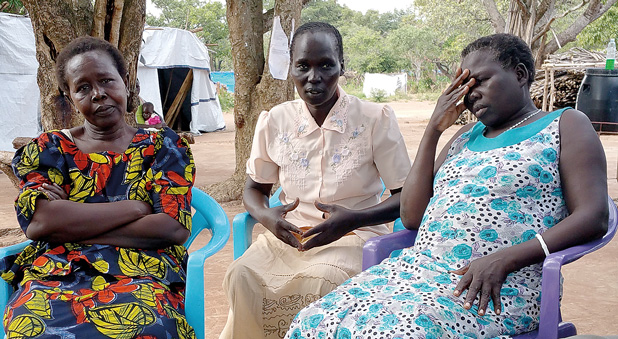An entire Diocese of the Episcopal Church of South Sudan is operating from Northern Uganda after being forced to flee from civil unrest, leaving the main centre, Kajo-Keji, a ghost town.
The diocese was home to hundreds of thousands of Sudanese, including 280,000 Anglicans. As long-standing partners of the Archbishop of Sydney’s Anglican Aid, operations and project manager Eddie Ozols flew to Uganda last month to investigate further ways of helping a church plunged into exile in makeshift refugee camps.
The first sign of imminent danger was in January, just four days after the consecration of diocesan Bishop Emmanuel Murye. Sudanese government soldiers carried out summary executions, torture, kidnapping and rape in Kajo-Keji.
“I sat stunned as Bishop Emmanuel reverently recounted that fateful day, listing six people executed as pawns in a national game of chess where the winner retains power and control of assets of this dirt-poor nation,” Mr Ozols says.
“The bishop had spoken to each person’s family, consoling them. Among the victims was a 32-year-old mother of seven: systematically raped, enduring grotesque obscenities before being eternally dispatched by bullets riddling her battered and abused body.”
The attacks, designed to instil fear in locals, sparked an exodus of 98 per cent of the population across the border into Uganda. Those who fled are now housed in refugee camps, including Bidi Bidi – said to be the largest camp in the world with more than 250,000 people. The diocese’s Anglicans are scattered across an area westwards to Rhino camp near Arua, which has 90,000 refugees.
“The diocese leaves behind buildings established over generations with the assistance of brothers and sisters worldwide – schools, hospitals, parish buildings and the diocesan headquarters,” Mr Ozols says. Anglican Aid has helped secure offices for the bishop and his leadership team, overseeing a church in exile with 66 parishes and more than 100 ordained clergy.
“The needs, as expected, are enormous. Trauma counselling to address the spiritual emptiness of so many, again forced to resettle. The greatest need expressed by people in all the camps is education for their children, not food, [but] monthly rations are being reduced from half to quarter... this means instead of the recommended 25kg of maize per household it is being reduced to 6kg.”
Mr Ozols says the Ugandan government generously prepared land for camps in anticipation of the people they knew would come. “Uganda knows a thing or two about persecution, many having spent years in camps in Sudan and Congo during Idi Amin’s reign of terror. Aid organisations have come in to do the basics: food, water, health care.”
Sadly, trauma and helplessness has led to some suicides. “I am told of a man who slashed his wife’s throat, killing her and then cutting his own throat and living,” Mr Ozols says. “Other people have eaten poisonous bush food to end the pain.”
During a camp tour he was a guest at a makeshift school. “The romantic notion of Africans sitting under trees to be educated is quickly shattered as the reality sinks in of sitting in the open under the hot African sun, subject to seasonal rains, flies and other insects and the impracticality of a chalk board hanging off tree stumps.”
He and Bishop Emmanuel were invited to speak. “What to say to children who have been through the horrors? I mention Australia. Some of them have relatives there. I explain Anglican Aid has provided support to the diocese to assist people in the camps. I tell them God loves them and many in Australia are praying for them and South Sudan. I speak about hope... God providing a better future for them.”
Exiled: women who are yet to join other refugees in Uganda wait at the Logo camp inside South Sudan. Photo courtesy Anglican Aid
























